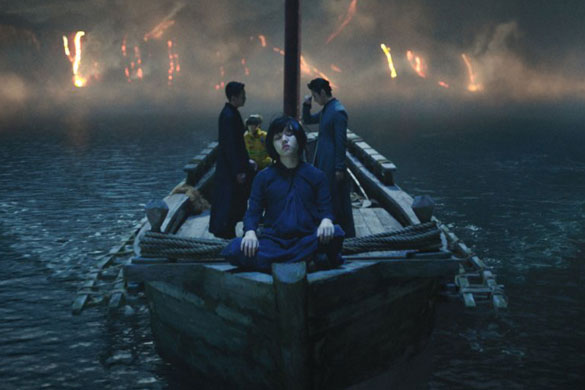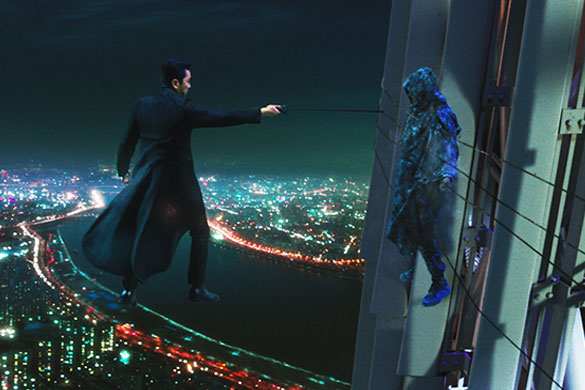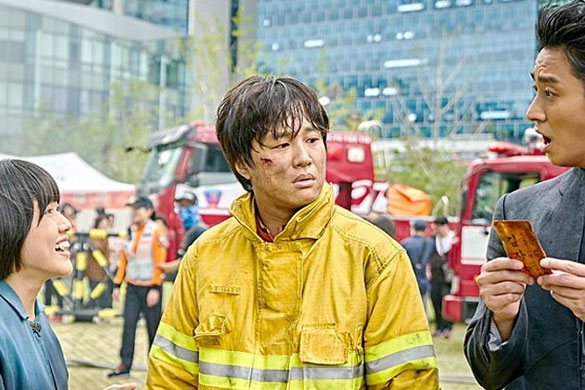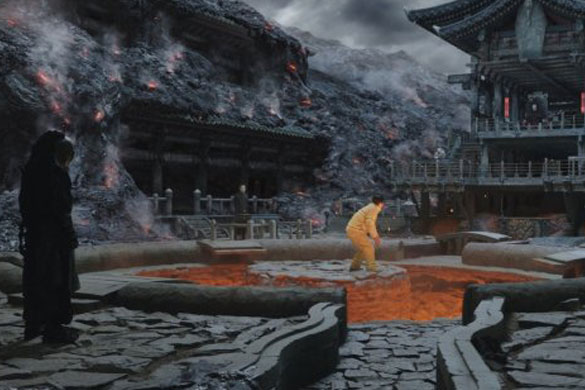"All humans live with sins.
Only a few ever have the courage to beg for forgiveness... and only a fraction of those are truly forgiven..."
Synopsis:
While attempting to rescue as many people as possible from a blazing apartment building inferno, firefighter Ja-hong (Cha Tae-hyun) is blasted through an upper storey window, holding a young girl in his arms. Left dangling in mid air at the end of a tether and harness, he desperately tries to pass the child to a colleague, but before he can do so fire burns through his rope and both Ja-hong and the child plummet to the ground. Ja-hong’s body breaks the girl's fall enabling her to run off unharmed to be reunited with her family but as Ja-hong stands, dusts himself off and begins to thank his lucky stars that he wasn't injured in the fall, he is rendered utterly dumbstruck on seeing his own bruised and bloody, lifeless body lying sprawled on the ground just a few feet away.
Before he can even begin to process the shocking, bewildering situation, Ja-hong is approached by two individuals dressed all in black – Haewon Mak (Ju Ji-hoon) and Deok-chun (Kim Hyang-gi) – who inform him that he is indeed dead and that they and their colleague/superior Gang-rim (Ha Jung-woo) are to be his guardians through a series of seven hell trials taking place in the Afterlife over a period of 49 days. Only if he passes each and every trial will Ja-hong be considered worthy enough to be reincarnated...
Review:
Immediately prior to Along with the Gods’ frenetic firefighting opening scene, text taken from Buddhist scriptures is shown on screen, stating: "When a person reaches the Afterlife, they are judged seven times over the course of 49 days. Tried by deceit, indolence, injustice, betrayal, violence, murder and filial impiety, only the souls who pass all trials are reincarnated."
As such, even non-Korean viewers and those with little or no knowledge of the Buddhist/Shaman idea that there are 49 days between death and the move to the next life/plane of existence will enter the film with at least a vague awareness of the spiritual context underlining the entire narrative. While this text ‘explanation’, if you will, doesn't entirely negate character exposition on the subject – Afterlife guardians Haewon Mak and Deok-chun still have to explain the situation to a deeply confused Ja-hong who hasn't even yet come to terms with the fact that he's dead – it does nonetheless ensure that the exposition present is as succinct as it can be, and as someone who is not a fan of dialogue exposition (or indeed clunky narration) in any way, shape or form, that brevity is as far as I'm concerned is a fairly positive beginning.
It will likely come as no surprise that a visually huge film detailing a journey through seven levels of hell requires the use of a frankly insane amount of CGI. This works well for the most part, even being absolutely breathtaking on occasion, but it does have to be said that there are instances, especially in fast moving action sections, where CG elements are rather apparent as being exactly that – the boat journey scene in the Hell of Deceit segment being a prime and noticeable example – and while this doesn't take away from viewer immersion particularly it is somewhat of an issue, nonetheless.
 |
As Ja-hong’s trials in the Afterlife continue, his backstory and that of his family is gradually revealed and this is by far the strongest line of the narrative and ultimately, to my mind, more interesting than the trials themselves, strikingly effects-laden though they may be. The juxtaposition of trial and backstory also allows Along with the Gods to deftly – almost effortlessly – morph from fantasy to drama, to revenge thriller, to ghost story, to melodrama and back (the merging of genres having been a huge plus point for Korean films since way back in the New Korean Cinema wave of the late 90s and early 2000s).
However, in terms of emotional resonance in melodramatic segments, I found it impossible to move away from feeling that specific narrative elements had been deliberately contrived with a “this will make audiences cry” aim from director, writer et al, and as such they largely felt distanced, leaving me feeling that I was rather being manipulated, and if there's one thing that will stop me being invested emotionally in a scene it's being ordered to do so. Ultimately, there was really only one melodramatic scene for me that truly succeeded in its tear-jerking aim – consisting of a conversation in the film's latter stages between Ja-hong’s brother and their mother –and that's because it is the natural narrative conclusion to the character arc of Ja-hong’s brother and as such is far more naturally emotive, too.
This is kind of par for the course with blockbusters and it's kind of understandable that with such an expansive narrative to detail and with so many huge set pieces to include that filmmakers of big budget productions tend to try to push their emotional hand, as it were, but, regardless, I could reference an absolute plethora of smaller, independent Korean films that tugged at my heart strings more naturally, had me on the edge of my seat more effortlessly and ultimately stayed with me far longer and consistently. Of course, you'd be well within your rights to say that in sitting down in front of a CGI-laden action/fantasy film viewers expectations should be tempered somewhat by that very fact, but that too is entirely my point.
 |
There are also references to past Korean socio-economic issues in Ja-hong and his family's backstory. These are rather more statements than more in-depth commentaries or critiques – again in a huge scale fantasy/action blockbuster there is only so much time available outside of the action set pieces, even if the overall running time is almost two and a half hours –but that said they do ultimately tie up the fantasy trial elements with the more realism-based segments fairly deftly to speak of both actions and consequence, and more importantly guilt and forgiveness; all wrapped up within an often visually stunning rollercoaster ride through the seven Hells of the Afterlife.
At the time of writing this review, Along with the Gods: The Two Worlds has become the second most successful Korean film of all time at the Korean box office; recently leapfrogging Ode to my Father and now only beaten in admissions by 2014's The Admiral: Roaring Currents. Considering the huge popularity of Joo Ho-min's webtoon of the same name on which Along with the Gods is based and the star-studded roll call of acting names old and new that virtually define quality Korean cinema (Ha Jung-woo, Lee Jung-jae, Kim Hyang-gi, Oh Dal-su, etc. etc.), the film's success was all but guaranteed and whether you feel Along with the Gods is ultimately truly and wholly worthy of the accolades associated with being one of the biggest box office smashes in Korean film history is rather a moot point because, regardless, that's exactly what it is. Personally, there are a fair few, far less successful Korean films that I'd urge and indeed beg people to see far in advance of even considering mentioning Along with the Gods, but I guess that's just the double-edged sword any film this successful has to face.
A second Along with the Gods film will be released mid-2018.The conclusion of The Two Worlds gives a pretty clear pointer of the story/stories this sequel/second part will be centred on but only time will ultimately tell how the film's box office admissions will compare to Along with the Gods: The Two Worlds' through-the-roof success.
Summary:
Along with the Gods: The Two Worlds is a tale of actions and consequences, guilt and forgiveness wrapped up within a visually stunning journey through the seven Hell trials of the Afterlife. Whether you feel Along with the Gods is ultimately truly and wholly worthy of the accolades associated with being one of the biggest box office smashes in Korean film history is rather a moot point because, regardless, that's exactly what it is.
ALONG WITH THE GODS: THE TWO WORLDS (신과함께 / 2017)
Director: Kim Yong-hwa
Starring: Ha Jung-woo, Cha Tae-hyun, Kim Hyang-gi, Lee Jung-jae
|





